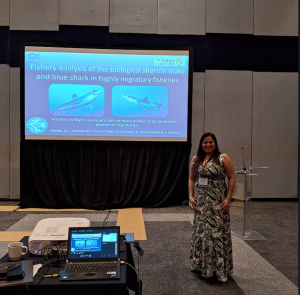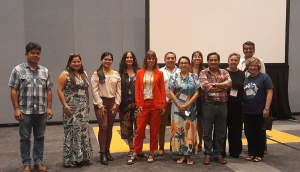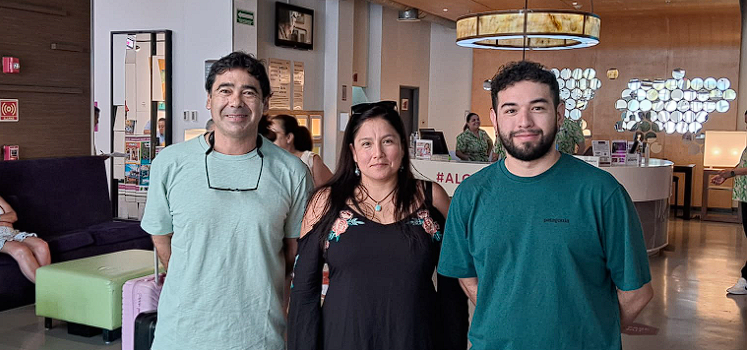IFOP researcher attends “Latin American & Caribbean fisheries congress 2023_ LACFC”, held in Cancun, Mexico.
July 11th, 2023 Ljubitza Clavijo Gorostiaga scientific researcher, who performs her duties in “Monitoring of Highly Migratory Resources, Ecosystemic Approach (SRAM ECO) project “, led by Patricia Zárate from Oceanography and Environment Department was invited to participate in the 1st Congress of Latin American and Caribbean Fisheries (LACFC) held during May in the city of Cancun, Mexico, which was attended by countries such as United States, Mexico, Peru, Colombia, Argentina, Belize and Chile among others.
Ljubitza Clavijo Gorostiaga scientific researcher, who performs her duties in “Monitoring of Highly Migratory Resources, Ecosystemic Approach (SRAM ECO) project “, led by Patricia Zárate from Oceanography and Environment Department was invited to participate in the 1st Congress of Latin American and Caribbean Fisheries (LACFC) held during May in the city of Cancun, Mexico, which was attended by countries such as United States, Mexico, Peru, Colombia, Argentina, Belize and Chile among others.
The organization of this congress was carried out by The American Fisheries Society, whose beginnings date back to 1948 in North America and which for the first time in its history organized a congress in Latin America and the Caribbean, where fisheries, management and conservation issues were exposed. , in addition to discussing society’s new guidelines and the possibility of establishing working groups focused on Latin America and the Caribbean.
 During this instance, the researcher presented on May 17th in Fisheries Bycatch and Discards session: RedCID an Iberoamérica and Caribe Network” the work entitled “Biological analysis of shortfin mako and bluebird fishing in highly migratory fisheries”, which condensed collaborative work results developed between Fisheries Development Institute (IFOP), within “Monitoring of Highly Migratory Resources project’s framework. Ecosystemic Approach (SRAM ECO) and The Nature Conservancy (TNC), carried out between 2019 and 2022. This collaboration made it possible to comprehensively to analyze and integrate the results of objective “synthesis of the state of knowledge of fisheries of highly migratory resources ” (SRAM ECO-IFOP) through FishPath (TNC) process, specifically on two species of pelagic sharks caught in Chile, mako shark (Isurus oxyrinchus) and blue shark (Prionace glauca), work that allowed progress in knowledge gaps identification for adequate fisheries management application with an ecosystemic approach.
During this instance, the researcher presented on May 17th in Fisheries Bycatch and Discards session: RedCID an Iberoamérica and Caribe Network” the work entitled “Biological analysis of shortfin mako and bluebird fishing in highly migratory fisheries”, which condensed collaborative work results developed between Fisheries Development Institute (IFOP), within “Monitoring of Highly Migratory Resources project’s framework. Ecosystemic Approach (SRAM ECO) and The Nature Conservancy (TNC), carried out between 2019 and 2022. This collaboration made it possible to comprehensively to analyze and integrate the results of objective “synthesis of the state of knowledge of fisheries of highly migratory resources ” (SRAM ECO-IFOP) through FishPath (TNC) process, specifically on two species of pelagic sharks caught in Chile, mako shark (Isurus oxyrinchus) and blue shark (Prionace glauca), work that allowed progress in knowledge gaps identification for adequate fisheries management application with an ecosystemic approach.
It should be noted that the interest in presenting these results during the aforementioned session is related to strengthening of collaborative relationships between SRAM ECO-IFOP group and Bycatch and Discard Network (RED CID) carried out in recent years, this latter led by Martin Hall Ibero-American Tropical Tuna Commission senior adviser , where different countries participate (United States, Brazil, Colombia, Argentina, Peru and Chile) and whose discussion focus is each country local problems in relation to bycatch, discards and fisheries in general.
Ljubitza Clavijo’s participation was possible thanks to the financial support of TNC Chile, represented by Natalio Godoy, who led the FishPath process for this organization together with the SRAM ECO-IFOP team led by Dr. Patricia Zárate.
